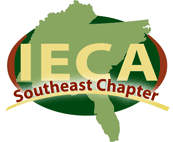
CHAPTER E-NEWSLETTER
APRIL 2018
|
|
|
J.P. Johns,
President
Phone: 864 -315-3844
Melanie McCaleb, Past President
Phone: 919-412-7537
Wilson Borden,
Treasurer
Rich McLaughlin,
Secretary
Phone:919-515-7306
Kim M. Kline,
Administrative Assistant
State Representatives
J. Blake Whitman -
AL
Hal Lunsford -
FL
Victoria Cheplak -
GA
Matt Powell -
KY
Ted Sherrod -
NC
Jay Sprague -
SC
Chris Todd -
TN
|
|
|
| Southeast Chapter Erosion _ Sediment Control Training _ Field Day |
|
|
Testing and Specifying Rolled Erosion Control Products-
|
C. J. Sprague, TRI/Environmental, Inc., United States & J. E. Sprague, TRI's Denver Downs Research Facility, United States
S
ediment continues to be a major pollutant of public water resources even though erosion control best management practices, BMPs, are now commonly used. In order to help protect water quality as it relates to sediments, regulatory agencies and site designers are increasingly asking how well specific BMPs will perform quantitatively relative to alternatives. While a large amount of information on erosion control products (ECPs) has been available for quite some time, the information has too often been non-standard, out-of-date, insufficient, or unable to be compared to alternative products, making it difficult for users to create generic construction specifications or qualified product listings of comparable products.
Standardized test procedures have been recognized as the means to develop comparable product data. Thus, a two decade effort by industry professionals has produced recognized tests for measuring relevant material properties as well as performance capabilities of ECPs - with most effort focused on rolled erosion control products (RECPs).
This paper discusses the details of these now commonly used standardized index, bench-scale, and large-scale tests for RECPs, along with a review of data from hundreds of independent tests performed on a range of RECPs under the auspices of the National Transportation Product Evaluation Program (NTPEP). Along with an assessment of the relevance and correlation of the various tests, recommendations will be made on the appropriate use of these test results in specifications for RECPs.
FOR THE FULL PAPER CLICK HERE
|
|
WE WANT YOU! Board Members Needed!
|
Interested in expanding your network and making more industry connections? Then consider joining The Southeast Chapter Board or just become involved in one of our many opportunities.
The Southeast Chapter of the International Erosion Control Association (IECA) represents a large area of the United States - Kentucky, Tennessee, Mississippi, Alabama, Florida, Georgia, South Carolina, and North Carolina. The international organization is the global resource for information on erosion and sediment control, and the Southeast Chapter is your local source for information that is important to you.
Members of the International Erosion Control Association (IECA) receive an assortment of benefits that enhance their career and allow them ability to network with those in the erosion and sediment control industry.
Assistance Needed For:
- MS4 Conference
- Lunch and Learns
- Networking Social Hours
- Fall Chapter Conference
|
|
Carolina Ecosystems, Inc. Currently has Two Open Positions for Qualified Environmental Scientists
|
Carolina Ecosystems, Inc. currently has two open positions for qualified environmental scientists - see below for a short summary of each position. Please email
[email protected] and visit our website at
www.carolinaeco.com for expanded job descriptions (under the Now Hiring tab).
Environmental Scientist - Mid-Level
Carolina Ecosystems is seeking a mid-level environmental scientist (BS required) to work out of our Clayton, NC office. Duties will primarily include, but not be limited to: team leader for stream determinations, wetland delineations, and permit applications for public and private projects. Other duties will include endangered species assessments and environmental report preparation. NCDOT experience is strongly desired. Travel, mostly within NC, and field work is required. Salary is negotiable, in addition to a full suite of benefits.
Environmental Scientist - Entry Level
Carolina Ecosystems is seeking an entry level environmental scientist (BS required) to work out of our Clayton, NC office. The successful candidate will assist our project and senior scientists with a variety of tasks including but not be limited to: stream determinations, wetland delineations, threatened and endangered species assessments, map production using ArcGIS and environmental report preparation. Travel, mostly within NC, and field work is required. Salary is negotiable, in addition to a full suite of benefits.
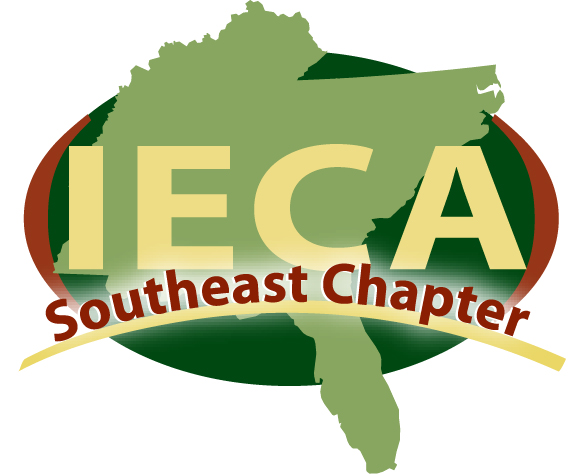
|
|
 |
|
A Note from the President
|

Municipal Wet Weather Stormwater Conference to be held in Chattanooga, TN
EPA Region 4 and IECA Region One in collaboration with IECA Southeast Chapter
|

G
reetings and salutations Southeast Chapter members! I hope the spring has been eventful and enjoyable for everyone so far. The Chapter continues to have great training events lined up, so please visit our webpage at www.secieca.org to view the schedules and dates. Remember to check the webpage periodically so you do not miss out on any of our outstanding training opportunities.
We had a very successful Southeast Chapter showing at the 2018 IECA National Conference in Long Beach this past February 11-14th.
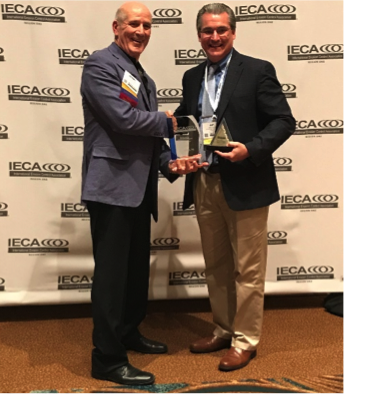 I am excited and honored to report that the Southeast Chapter received the 2017 Part
ners for Excellence Award for Outstanding Education and Programming. We could not have
received this award without the exceptional training opportunities provided and the extraordinary attendance of our members at these training events. Thanks to all of you who make these training events happen!
I am excited and honored to report that the Southeast Chapter received the 2017 Part
ners for Excellence Award for Outstanding Education and Programming. We could not have
received this award without the exceptional training opportunities provided and the extraordinary attendance of our members at these training events. Thanks to all of you who make these training events happen!
I am also humbled to announce the 2018 Most Distinguished Technical Paper Award for "Inspection and Data Collection Protocol to Monitor Performance of Biotic Soil Technology" was presented to Southeast Chapter members Marc S. Theisen, M.Sc., CPESC, CPSWQ, CESSWI and J.P. Johns, PE.
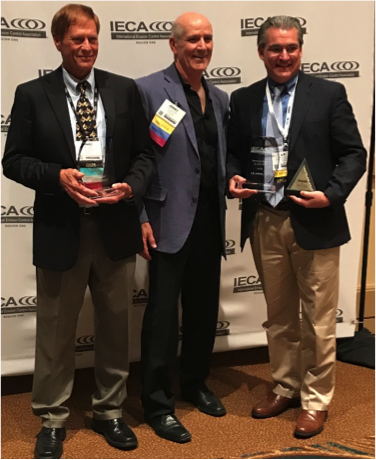 We are excited that the 5th Municipal Wet Weather Stormwater Conference will be held in Chattanooga TN May 21st -23rd 2018. This unique conference is hosted by US EPA and the Southeast Chapter and the agenda features cutting-edge sessions to help you master the challenges of managing municipal stormwater programs and make the right decisions for your business. We will be having an official Chapter meeting on Monday May 21 at 2:00 PM. I hope to see all of you there! New to the event this year, there will be a post event field trip on Wednesday May 23rd. Directly following the Municipal Wet Weather Stormwater Conference, Propex GeoSolutions and Profile will host a field visit to an installation site featuring new erosion control solutions. A box lunch and transportation will be provided. Please note that this event is free to conference participants. In order to participate, you must register separately and there is limited space available. See the conference webpage on how to register for the conference and the field trip and Register by April 23, 2018 for the best price! We are excited that the 5th Municipal Wet Weather Stormwater Conference will be held in Chattanooga TN May 21st -23rd 2018. This unique conference is hosted by US EPA and the Southeast Chapter and the agenda features cutting-edge sessions to help you master the challenges of managing municipal stormwater programs and make the right decisions for your business. We will be having an official Chapter meeting on Monday May 21 at 2:00 PM. I hope to see all of you there! New to the event this year, there will be a post event field trip on Wednesday May 23rd. Directly following the Municipal Wet Weather Stormwater Conference, Propex GeoSolutions and Profile will host a field visit to an installation site featuring new erosion control solutions. A box lunch and transportation will be provided. Please note that this event is free to conference participants. In order to participate, you must register separately and there is limited space available. See the conference webpage on how to register for the conference and the field trip and Register by April 23, 2018 for the best price!
http://www.ieca.org/IECA/Events/IECA_Chapter_Events/MS4_Conference/IECA/IECA_Events/MS4_Conference.aspx
I want to continue to re-iterate that IECA and our Chapter are striving to provide the best services for our members. We continue look to provide new local opportunities throughout the Chapter for all members to participate in. These opportunities may include but are not limited to lunch-and-learns and after hour socials with other local members and State Representatives. Please let me, or any of our Officers know if you are interested in helping us with implementing this in your area, or if you have any ideas or recommendation son how we can make this happen.
I look forward to a great remainder of 2018!
J.P. Johns, PE
2017/2018 Southeast Chapter President
|
|
Macaferri has a scholarship program for students for a year in Italy. Stay tuned to IECA for information on the 2018 IECA Southeast Chapter Erosion & Sediment Control Training & Field Day!

James E. (Jay) Sprague, CPESC
Laboratory Director
Denver Downs Research Facility
|
North Carolina Updates
NPDES NCG010000 Up for Renewal
North Carolina's NPDES Construction General Permit expires in July and plans are underway for its renewal. Two stakeholder meetings on the permit renewal have been scheduled; one for April 9
th and the other for April 23
rd. Both meetings will be conducted from 1:00 to 4:00 in
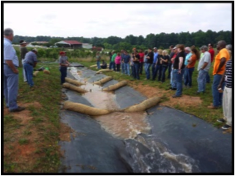 the afternoon in the Archdale Building's Ground Floor Hearing room in Raleigh. Annette Lucas, PE, Stormwater Program Supervisor, with NCDEQ's Division of Energy, Mineral and Land Resources is leading this effort.
Erosion, Sediment, and Turbidity Control Training Opportunities
NCSU is sponsoring an Erosion, Sediment, and Turbidity Control Workshop and Field Day on May 3
rd at the Booth Field Learning Lab at the SECREF in Raleigh. Attendees will take part in discussions and view demonstrations that illustrate the cost and effectiveness of a wide variety of options for designers, construction managers, grading contractors, inspectors, and regulators. Get first hand knowledge about new products and s
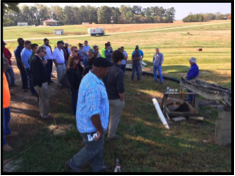 ystems that are in use now to alleviate erosion, sediment, and turbidity control (ES&TC) problems. The event will include classroom and field activities, so come prepared to get your hands dirty. Register before April 20
th for an early bird discount. Full details and registration information is located here:
go.ncsu.edu/erosion-control-ce
to locate an upcoming session near you. Attendees from municipalities, counties, federal, state, utility, and solar companies are welcome and often attend in addition to NCDOT consultants, contractors and staff.
International Erosion Control Association Conference slated for Raleigh in 2020
IECA will hold its annual Environmental Connection Conference on February 23-26, 2020 at the Raleigh Convention Center. Recent conference venues include Atlanta, Georgia in 2017, Long Beach, California this year, and Denver, Colorado in 2019. The trade show will likely be the biggest display of erosion and sediment control and stormwater management vendors in
 North Carolina's history. Educational sessions from E&SC professionals all over the world will assemble in Raleigh for this event. Field tours featuring NCSU's Sediment and Erosion Control Research Facility will be visited by hundreds. Over two thousand attendees and vendors are expected. Make plans to attend and consider presenting a paper or presentation or volunteer to help. Contact Ted Sherrod for more information.
Thanks to all my E&SC colleagues and friends for your prayers and words of encouragement after my recent illness. Thankfully, I am making good progress towards a full recovery.
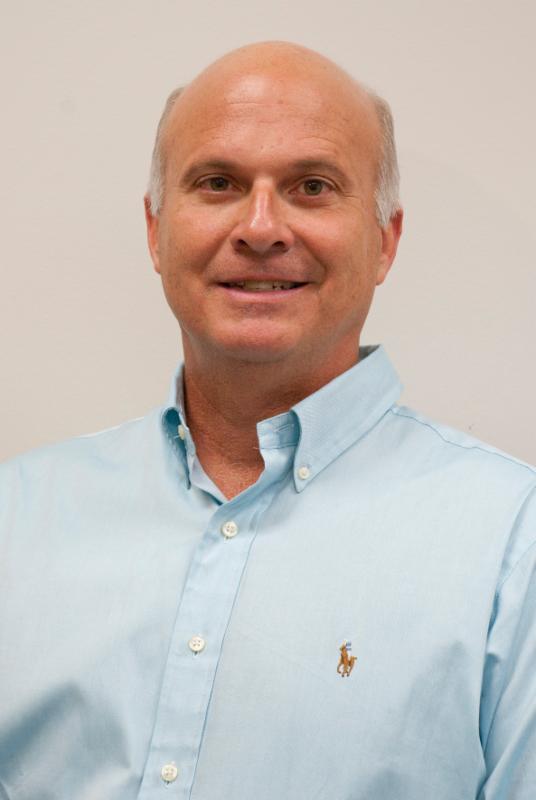
Keep it
between the ditches!
Ted Sherrod, NC Representative
|
Florida Updates
A new stormwater manual is coming out in June to include green infrastructure and water sampling instructions. Their certification program is now online and automated. There will be four Muddy Water Blues events in the fall in Miami, Tampa, Jacksonville, and Pensacola.
All events can be registered for by going to our State of Florida's webpage link:
www.dep.state.fl.us/water/nonpoint/erosion.htm
.
Hal Lunsford, ESIII - Statewide FSESCI Training Coordinator
|
Georgia Updates
 Please contact Victoria if you are interested in organizing a Lunch and Learn of Networking Social Hour in 2018.
Please contact Victoria if you are interested in organizing a Lunch and Learn of Networking Social Hour in 2018.
Victoria Cheplak -GA Representative
|
Alabama Updates
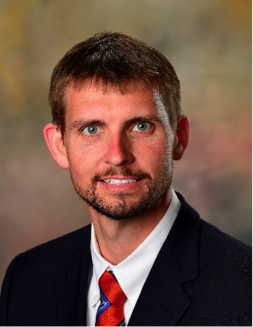
Most handbook changes are related to the Work at Auburn University's Erosion and Sediment Control Test Facility:
Check Dams
Check dams now will have a geotextile underlayment to prevent undermining.
Rock check dams will use geotextile on the front face to improve trapping efficiency.
In addition to Rock Check Dams the practice also includes information on:
- Wattle Check Dams
- Silt Fence Check Dams
- Sand Bag Check Dams
Inlet Protection
This practice now encompasses ALL check dams (Fabric and Block and Gravel were incorporated into this new practice)
Inlet protection also utilizes a geotextile underlayment to prevent undermining.
The practice includes information on:
- Silt Fence inlet protection
- Block and Gravel inlet protection
- Sand Bag inlet protection
- Wattle inlet protection
Sediment Barrier
There are only 2 types of silt fence in the handbook now instead of 3. Basically, one is reinforced and one in not.
Silt fence post spacing should be closer when ponding water.
The geotextile fabric requirements per AASHTO M288 are added.
Sediment Basin
PAM should be added upstream in a turbulent flow area and not on the first baffle as before.
State Soil and Water Conservation Society meeting in Florence June 20-22. Clearwater AL is in Oxford August 22-23. The state handbook for erosion and sediment control will be out in revised version by the summer, and will include a new section on sediment barriers.
J. Blake Whitman -GA Representative
|
Tennessee Updates
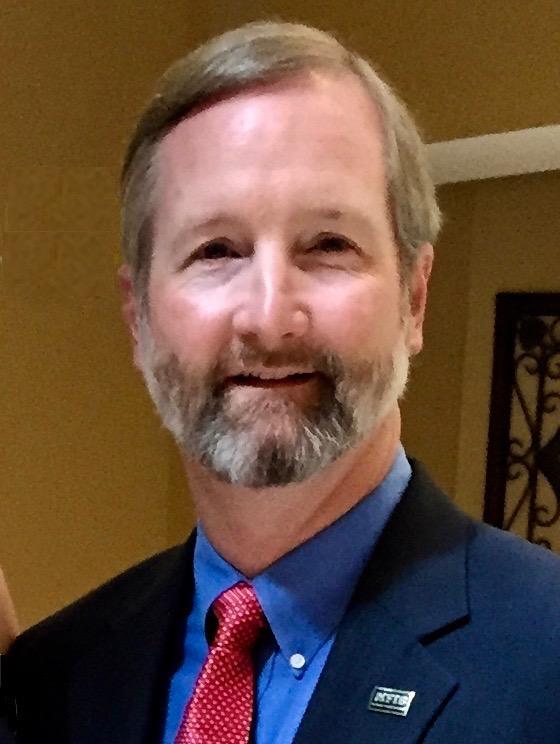
Please contact Chris if you are interested in organizing a Lunch and Learn of Networking Social Hour in 2018.
Chris Todd - TN Representative
|
Kentucky Updates
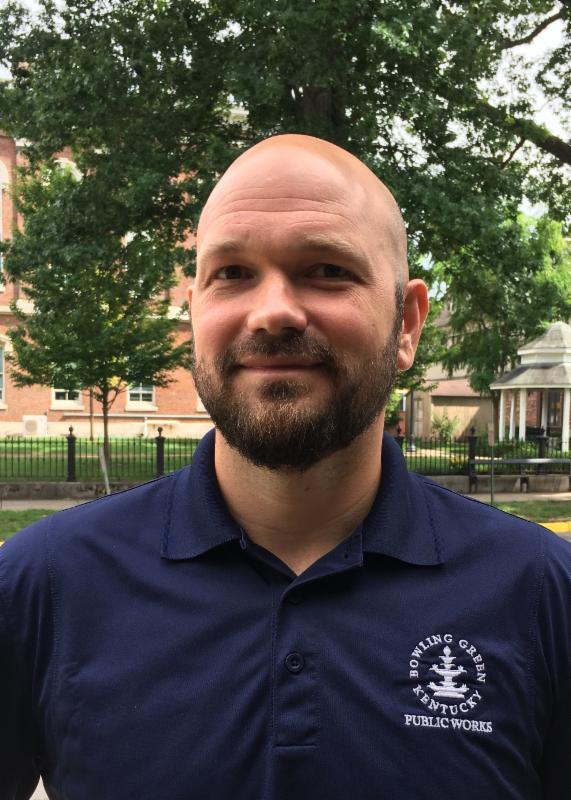
Please contact Matt if you are interested in organizing a Lunch and Learn of Networking Social Hour in 2018.
Matt Powell Representative
|
|
|
2018 Municipal Wet Weather Stormwater Conference
|

Attend the Municipal Wet Weather Stormwater Conference to engage in meaningful conversations with stormwater professionals to further your business.
Municipal Wet
Weather
Stormwater (MS4) Conference May 21 - 23, 2018
The Chattanooga | Chattanooga, TN
The agenda features cutting-edge sessions to help you master the challenges of managing municipal stormwater programs and make the right decisions for your business.
Hot Sessions to Attend:
-
Opening Keynote
- Urban Streams: Turning Liabilities into Assets -
Presented by Greg Jennings,
Ph.D., PE
-
Workshop
- Stormwater Department Role in Emergency Situations -
Presented by Kristen A.
O'Reilly, BS, MS, RS
-
Technical Paper
-
The Stormwater Benefits of High-Performance Urban Trees -
Presented by
Matthew Werle
-
Case Study
- Finding and Reducing Bacteria at the Source with Droplet Digital PCR -
Presented
by Mauricio Larenas
-
Technical Paper
- Design and Construction of a Large-Scale Testing Apparatus for Evaluating
the Performance of Catch Basin Inserts -
Presented by Dakota L. Basham
-
EPA Presentations
- EPA Updates and Construction General Permit Track -
Presented by Sean Ireland, US EPA - Region 4 and Mike Mitchell, US EPA - Region 4
-
Closing Keynote
-
Green Infrastructure & Ecosystem Services: the Future of Stormwater
Management
- Presented by William Hunt, Ph.D.
Register before the April 23 early bird deadline to save.
Register online at www.ieca.org/MS4Event or call 800-220-3153 for assistance
.

|
|
Erosion Control Products Netting and Snakes -
|
Spring is here and in many parts of our region snakes are starting be active again. In 2005, a report was published on snake entanglement in netting that was part of rolled erosion control blankets (RECPs) used in wetland restoration projects in South Carolina
1. The authors reported a total of 19 snakes were found, mostly dead, entangled at the 15 restoration sites, all of which had a single width (2.4 m, 8') of blanket installed. The plastic mesh openings were reported as 10 or 20 mm
2, with either coconut/straw or coconut filler. The most common snake found was a black racer, which tends to undulate rapidly when trapped, a behavior which only makes matters worse when caught in netting. One of their recommendations was smaller (<5 mm
2) openings, such as are typical of permanent RECPs.
Another report was published in 2011 based primarily on snake entanglements that were reported to state officials in Wisconsin.2 The incidents, which occurred in various parts the state over a period of 7 years, were photographically
 |
|
 |
Dead copperhead entangled in plastic netting of an erosion control blanket adjacent to a sediment basin. Photo courtesy Rich McLaughlin_ North Carolina State University. |
documented and included several cases of plastic netting used for animal exclusion in addition to RECPs. It appeared that the RECPs were all installed adjacent to streams or wetlands. Additional cases were mentioned from personal communications.
The authors make a number of suggestions to avoid inadvertently trapping snakes in erosion control products, mainly to avoid using conventional RECPs that have standard plastic netting. This is a common recommendation when RECPs are used around water bodies. They do not recommend using a smaller mesh size as these may entangle smaller or juvenile snakes. Netting that is not welded at thread intersections so the threads can move independently, such as coir or jute, was suggested as an alternative. Very large mesh netting or netless RECPs were also recommended. They also cited an unpublished study of a different types of netting including
NatureZone ® (Conwed Global Netting Solutions, Minneapolis, Minnesota, USA)
in which snakes were exposed to the netting in enclosures. Netting with elongated openings (rectangular) were found to be less likely to entangle the snakes, although the authors cautioned that larger, more thick-bodied snakes may still be at risk. Of course, using something other than RECPs is another approach, but they acknowledge that in places that might be inundated, such as stream banks, loose products such as straw or hydromulch could not be used.
There is a strong need for further study in their view since most of the information available is anecdotal. For instance, they suggest that surveys be conducted for 3-6 months after RECPs are installed to determine the actual risk of entanglement. Both surveys of installed products and controlled studies should be conducted to determine the actual risks to snakes, and they would like this information to be published and freely available in the scientific literature.
1
Barton, C., and K. Kinkead. 2005. Do erosion control and snakes mesh? J. Soil Water Cons. 60 (2): 33A-35A.
2Kapfer, J. M., and R. A. Paloski. 2011. On the threat to snakes of mesh deployed for erosion control and wildlife exclusion.
Herpetological Conservation and Biology 6(1): 1-9.
|
|
|
|
|
Copyright © 2016. All Rights Reserved.
|
|
|
|